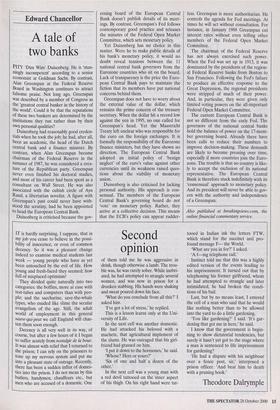Edward Chancellor
A tale of two banks
PITY 'Dim Wim' Duisenberg. He is 'stun- ningly incompetent' according to a senior economist at Goldman Sachs. By contrast, Alan Greenspan at the Federal Reserve Board in Washington continues to attract fulsome praise. Not long ago, Greenspan was described by a member of Congress as the 'greatest central banker in the history of the world'. Could it be that the reputations of these two bankers are determined by the institutions they run rather than by their own personal qualities?
Duisenberg had reasonably good creden- tials when he took the job; he had, after all, been an academic, the head of the Dutch central bank and a finance minister. By contrast, when Alan Greenspan became chairman of the Federal Reserve in the summer of 1987, he was considered a crea- ture of the Republican party. Greenspan never even finished his doctoral studies, and most of his career had been spent as a consultant on Wall Street. He was also associated with the cultish circle of Ayn Rand, a libertarian novelist. A figure with Greenspan's past could never have with- stood the scrutiny, had he been appointed to head the European Central Bank.
Duisenberg is criticised because the gov- erning board of the European Central Bank doesn't publish details of its meet- ings. By contrast, Greenspan's Fed follows contemporary good practice and releases the minutes of the Federal Open Market Committee, which sets monetary policy.
Yet Duisenberg has no choice in this matter. Were he to make public details of his bank's monetary policy, it would no doubt reveal tensions between the 11 national central bank governors from the Eurozone countries who sit on the board. Lack of transparency is the price the Euro- pean Central Bank pays to maintain the fiction that its members have put national concerns behind them.
Greenspan does not have to worry about the external value of the dollar, which remains the prime concern of the treasury secretary. When the dollar hit a record low against the yen in 1995, no one called for Greenspan's head. Yet the Maastricht Treaty left unclear who was responsible for the euro on the foreign exchanges. It is formally the responsibility of the Eurozone finance ministers, but they have shown no direction. The European Central Bank adopted an initial policy of 'benign neglect' of the euro's value against other currencies until its weakness raised ques- tions about the viability of monetary union.
Duisenberg is also criticised for lacking personal authority. His approach is con- sensual. The members of the European Central Bank's governing board do not `vote' on monetary policy. Rather, they arrive at a collective decision. This means that the ECB's policy can appear rudder- less. Greenspan is more authoritarian. He controls the agenda for Fed meetings. At times he will act without consultation. For instance, in January 1988 Greenspan cut interest rates without even telling other members of the Federal Open Market Committee.
The chairman of the Federal Reserve has not always exercised such power. When the Fed was set up in 1913, it was dominated by the presidents of the region- al Federal Reserve banks from Boston to San Francisco. Following the Fed's failure to produce an effective response to the Great Depression, the regional presidents were stripped of much of their power. And, in particular, they were given only limited voting powers on the all-important Federal Open Market Committee.
The current European Central Bank is not so different from the early Fed. The governors of the national central banks hold the balance of power on the 17-mem- ber governing board. Already there have been calls to reduce their numbers to improve decision-making. These demands are likely to become pressing over time, especially if more countries join the Euro- zone. The trouble is that no country is like- ly to accept the exclusion of its national representative. The European Central Bank is therefore stuck indefinitely with its `consensual' approach to monetary policy. And its president will never be able to gov- ern with the authority and independence of a Greenspan.
Also published at breakingviews.com, the online financial commentary service.


























































































 Previous page
Previous page